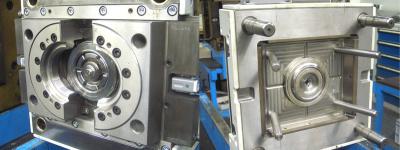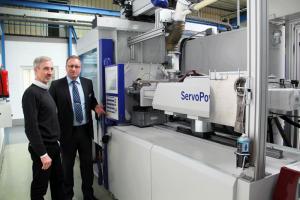Technical Report 2014-04-08
Content shown in the technical articles are the sole opinion and views of the authors or companies, which are not necessarily congruent to opinion and views of the editors.
|
Reduction of pollutants through innovative plastics technology in cars Gabriele Hopf, Wittmann Battenfeld GmbH Lighter weight with equal or higher performance – this is the challenge facing the automotive industry, caused by the demand to reduce the emission levels and fuel consumption of motor vehicles. This is why innovative, extremely hard-wearing plastic parts of superior quality are becoming more and more important. Winkelmann Powertrain Components, a company based in Ahlen / Germany, recognized this trend at an early stage and has relied on thermoset materials for the production of belt pulleys ever since. Wittmann Battenfeld supplies the machines for this purpose. The company today known as the Winkelmann group was founded in 1898 by Heinrich Winkelmann and Caspar Pannhoff to manufacture kettles, coffee pots, wash basins, dustpans and milk cans. It has developed into a group of companies which now employs more than 3,000 associates worldwide, of whom about 700 are working in Ahlen, realizing some 500 million Euros per annum in sales. In addition to its Ahlen facility, Winkelmann maintains production plants in Poland, Turkey and China. The Winkelmann group is divided into the business areas of heating and water systems, automotive parts and drive elements, with the first two segments contributing the major part of the company’s sales volume.
In the area of automotive parts, Winkelmann specializes in 4 product lines, namely drive system components, torsional vibration dampers, fuel distribution systems and belt pulleys. The company’s belt pulley production originates from sheet metal cold forming, one of Winkelmann’s core competencies. In 1992, the production of plastic parts was introduced in addition to the belt pulleys originally made of steel and later of aluminum. In this context, three fundamental decisions were made: phenolic resin reinforced with fiberglass and minerals was chosen as the material to be processed, this material was to be formed by a unique proprietary injection-stamping process specially developed for this purpose, with the registered trade mark WIN:DUR, and Battenfeld was to supply the injection molding machines. The first belt pulleys made of thermoset were delivered to BMW. Today, Winkelmann has already injection-stamped some 50 million belt pulleys for water pumps, hydraulic power steering pumps and camshaft drives. Winkelmann expects great future potential primarily for the latter because of the reduction in weight and the cost savings compared to metal parts. Moreover, this company is one of the few manufacturers offering hybrid pulleys, which are made of thermoset combined with other materials such as metal, thermoplastics and elastomers. The success formula: thermoset processing with injection-stamping technology  Kernprägewerkzeug: links bewegliche Seite mit Prägekern, rechts feste Seite mit Angussbuchse und Boden (Foto: Winkelmann Powertrain Components GmbH & Co. KG) Accordingly, using injection-stamped thermoset to produce belt pulleys offers a number of advantages. In addition to the already-mentioned aspect of weight and cost reduction compared to metal, these are high sound absorption, a wear-resistant surface, excellent homogeneity, since the fiberglass is not oriented in any preferred direction, and high media resistance against all known substances in the engine compartment. As the outer skin of the product consists exclusively of resin due to this special process, a long service life for the belt is ensured as well. Basically, it is also possible to manufacture belt pulleys from fiberglass-reinforced thermoplastics. However, thermoplastic materials with comparable performance attributes are far too expensive because of the complex material composition which is required to ensure the necessary thermal stability, and so they are not competitive. Therefore Winkelmann has never regarded them as an alternative.  Riemenscheibe mit Kugellager zum Antrieb eines Klimakompressors (links), Zahnriemenrad aus Duroplast für den Antrieb der Nockenwelle mit integrierter Verstelleinheit für die Nockenwellenverstellung (mitte), Prototyp eines Zahnriemenrads aus Duroplast für den Antrieb einer Nockenwelle (rechts) Fotos: Winkelmann Powertrain Components GmbH & Co. KG Thermoset belt pulleys are currently used in air-conditioning compressors, water pumps and power steering pumps. Primarily due to the enormous reduction in weight compared to metal, Winkelmann sees future fields of application in camshaft drive systems, crankshaft dampers or belt drive systems for power steering, which are currently still at the prototyping stage. Apart from that, Winkelmann is working on the further development of hybrid components made of steel, thermoset and elastomer, which could have an extensive field of application primarily in the area of damping. Here, the “decoupled” belt pulleys, whose designation is derived from their special design and function, offer the option of decoupling the belt drive and the aggregates connected with it from the rotational vibration of a combustion motor’s crankshaft drive. Winkelmann relies on thermoset machines from Wittmann Battenfeld Winkelmann currently operates its thermoset production plant in Ahlen with 23 injection molding machines with clamping forces ranging from 100 to 150 t, all coming from Wittmann Battenfeld. Dipl.-Ing. Axel Neukirchen, graduated engineer and Thermoset Product Manager at Winkelmann comments: “During our initial phase in the 1990s, Battenfeld emerged as the machine manufacturer with the greatest competence and readiness to adapt its machines to the injection-stamping process, and thus proved to be the right partner for us”. The production was started with the predecessor models of today’s hydraulic HM series, the 3-platen machines from the CDC series with central clamping cylinders. In 2013, the first two machines from the HM series were delivered. These are HM 150/1000 ServoPower models with 150 t clamping force, equipped with energy-efficient servo drives, W821 robots from Wittmann with the modern R8 control system for parts removal and insertion of metal rings, and Wittmann temperature controllers from the TEMPRO plus D series for barrel tempering. Moreover, the machines come with the complete package of options required for thermoset processing. In addition, special execution sequences required for the process in use at Winkelmann have been installed, including relevant monitoring functions. In order to ensure tension-free, perfectly formed parts, an additional injection-stamping cylinder has been mounted on the machine to condense the cavity, with the effect of applying additional force to the cavity by the hydraulic cylinder via the core during the injection process. Wittmann Battenfeld GmbH Wiener Neustädter Straße 81 Phone: +43 2252 404-0 Internet: www.wittmann-group.com |
 back to the list back to the list |  back to top back to top |





